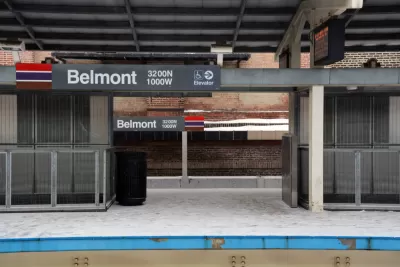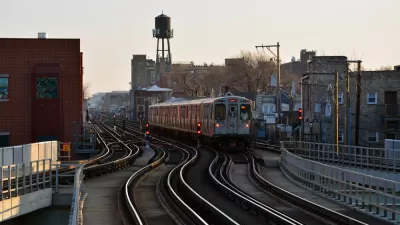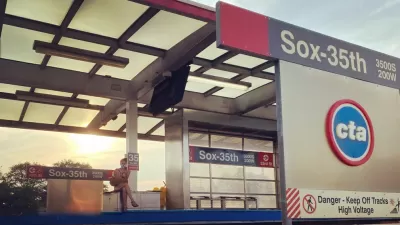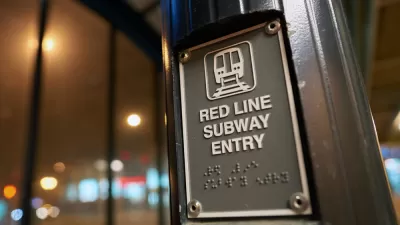A flyover to clear a bottleneck of trains serving the Red, Brown, and Purple lines is a key component of the massive modernization project planned by the Chicago Transit Authority.

"The CTA board on Wednesday approved contracts for the largest and costliest construction project in CTA history: the massive $2.1 billion Red and Purple Line modernization," reports Mary Wisniweski.
"The board also approved a contract for preliminary work on an even larger project: the proposed $2.3 billion extension of the Red Line from 95th Street to 130th Street," adds Wisniweski.
The Red and Purple Line modernization project is expected to begin in fall 2019 and wrap up in 2025. Wisniweski includes the details of thwt exactly the CTA will be building for the project. Planetizen has been following the planned modernization project since it was first announced in 2014. Here are some of the highlight moments for the project on the path to this week's news.
- Demolition Starts for CTA's Controversial Flyover Project (March 2018)
- Tax Increment Financing District Proposed for Chicago's Big Flyover Transit Project (August 2016)
- Environmental Review Backs Flyover Plans for El Tracks on Chicago's Northside (May 2015)
- High Profile Opposition to Chicago Transit Authority's Flyover Project (May 2014)
- Chicago Planning Flyover Fix for North Side El Lines (April 2014)
As for the Red Line extension project, Wisniweski explains that the contract approved this week will allow for environmental reviews and preliminary engineering work. The CTA has not determined how it will pay for whatever plan emerges from these early efforts.
FULL STORY: CTA approves contracts that pave the way for $2.1 billion Red-Purple Line modernization

Maui's Vacation Rental Debate Turns Ugly
Verbal attacks, misinformation campaigns and fistfights plague a high-stakes debate to convert thousands of vacation rentals into long-term housing.

Planetizen Federal Action Tracker
A weekly monitor of how Trump’s orders and actions are impacting planners and planning in America.

In Urban Planning, AI Prompting Could be the New Design Thinking
Creativity has long been key to great urban design. What if we see AI as our new creative partner?

King County Supportive Housing Program Offers Hope for Unhoused Residents
The county is taking a ‘Housing First’ approach that prioritizes getting people into housing, then offering wraparound supportive services.

Researchers Use AI to Get Clearer Picture of US Housing
Analysts are using artificial intelligence to supercharge their research by allowing them to comb through data faster. Though these AI tools can be error prone, they save time and housing researchers are optimistic about the future.

Making Shared Micromobility More Inclusive
Cities and shared mobility system operators can do more to include people with disabilities in planning and operations, per a new report.
Urban Design for Planners 1: Software Tools
This six-course series explores essential urban design concepts using open source software and equips planners with the tools they need to participate fully in the urban design process.
Planning for Universal Design
Learn the tools for implementing Universal Design in planning regulations.
planning NEXT
Appalachian Highlands Housing Partners
Mpact (founded as Rail~Volution)
City of Camden Redevelopment Agency
City of Astoria
City of Portland
City of Laramie





























